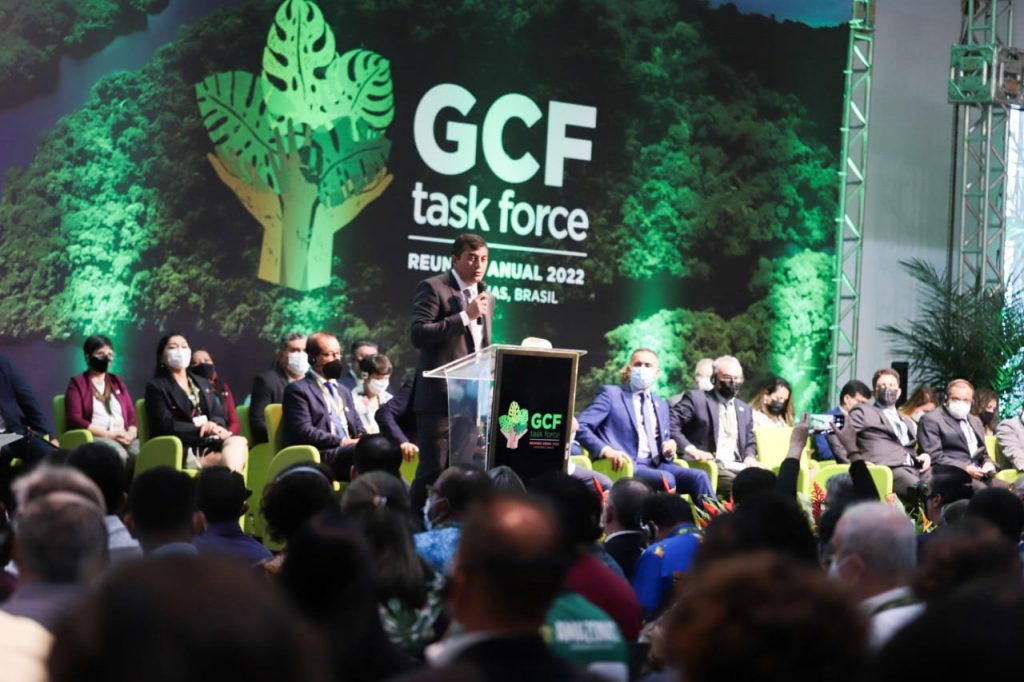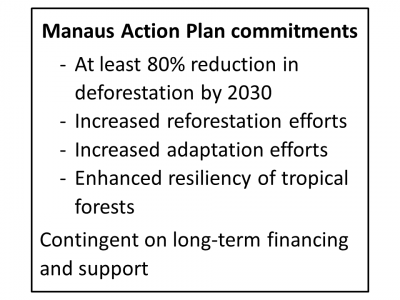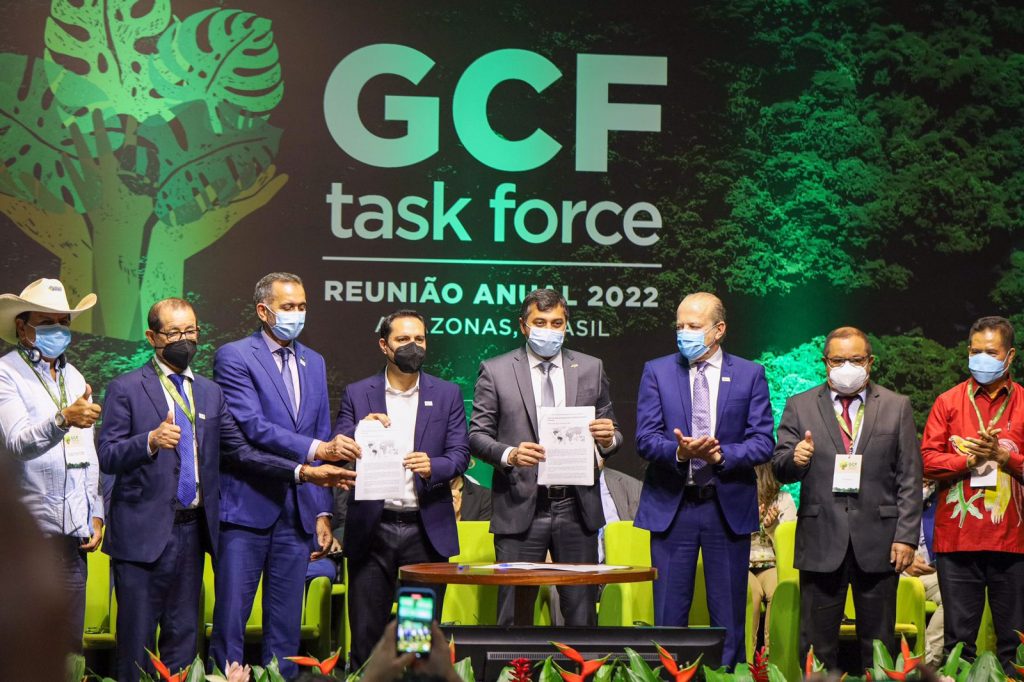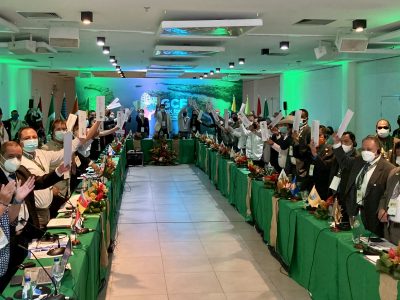Governors Launch Action Plan to Reduce Deforestation and Improve Lives in Forested Regions
Manaus Action Plan for a New Forest Economy advances ambitious action at Governors’ Climate and Forests Task Force 12th Annual Meeting hosted by state of Amazonas

For more than a decade of leadership and innovation, member states and provinces of the Governors’ Climate and Forests (GCF) Task Force have been developing strategies, programs, investment plans, and new legal structures to address tropical deforestation, embark on a low-emissions development path, and benefit their populations and the climate. These governments have developed jurisdiction-specific, regional, and partnership-wide efforts to achieve these goals, and this has culminated in a new call to action through what is being called the Manaus Action Plan for a New Forest Economy (MAP).
In this plan, GCF Task Force members are issuing a clear vision of their realities and needs, as well as an urgent call for recognition and partnership to reduce deforestation and improve people’s lives in forested regions. Through the MAP, GCF Task Force members are also committing to reducing tropical deforestation by at least 80% by 2030, increasing reforestation and adaptation efforts, and enhancing the resilience of tropical forests, with sufficient, long-term financing and support.
 Achieving the goals of the MAP will involve partnerships and collaboration among subnational states and provinces and the private sector, Indigenous peoples and local communities, financial institutions, donors and national governments, civil society, and academia, recognizing tropical forest jurisdictions’ priorities and plans for a new forest economy that will work for all the people living in these states and provinces.
Achieving the goals of the MAP will involve partnerships and collaboration among subnational states and provinces and the private sector, Indigenous peoples and local communities, financial institutions, donors and national governments, civil society, and academia, recognizing tropical forest jurisdictions’ priorities and plans for a new forest economy that will work for all the people living in these states and provinces.

The MAP is made up of four strategic pillars to ensure it is constructed with a robust foundation for action, recognizing the importance of each pillar and the interconnectedness of all four:
- People and Communities
- The new forest economy must work first and foremost for the people and the communities in the GCF Task Force states and provinces.
- This includes the people who live in and near forests, as well as people who live in cities and towns.
- Ongoing efforts to secure land tenure rights for communities must be the foundation of these efforts, and the jurisdictions pledge to continue working with Indigenous Peoples and Local Community partners and their respective national governments to secure those rights.
- Knowledge, Technology, and Innovation
- We must mobilize science and technology, along with the traditional knowledge and wisdom of people living in the forest.
- Innovation hubs in tropical forest regions have great potential.
- New data and knowledge platforms can help monitor, report, and verify jurisdictional performance as well as assess new opportunities for sustainable land use.
- Partnerships are needed to help assess new market regulations for major exports, certification and traceability requirements and systems, and new creative, locally based solutions to improve value chains and ensure market access for sustainable, forest-based products.
- Finance, Investment, and the Private Sector
- A new forest economy cannot be created without substantial additional financial support.
- GCF Task Force members have developed detailed investment plans associated with their jurisdictional strategies and mapped and assessed their needs for capacity to access different financial opportunities.
- This work should be the foundation for efforts to develop new financing arrangements and ensure that we do not engage in redundant activities to assess needs and evaluate readiness.
- Government and Public Policies
- Good governance and durable public policies are the bedrock of our jurisdictional strategies and investment plans.
- Many GCF Task Force states and provinces are actively revising existing laws and also adopting new laws, policies, and programs to advance a new forest economy. This includes embedding the Guiding Principles of Collaboration and Partnership between Subnational Governments, Indigenous Peoples and Local Communities into state laws and policies.
Members of the GCF Task Force formally launched the MAP during the opening ceremony of the GCF Task Force’s 12th Annual Meeting on Thursday, March 17. In endorsing the MAP, each tropical region will include more details on its own set of strategies, plans, and needs, to accomplish a reduction in deforestation of at least 80% by 2030, an increase in forest restoration and adaptation efforts, and enhanced resilience of tropical forests, contingent on financial recognition of action.
This work is aligned with what the science says is required. Recent articles (e.g., here and here) reported on a new study in Nature Climate Change that found that the need for action to address tropical deforestation is more urgent than ever. The very resiliency of these forests – upon which depend not only vast networks of rivers, habitats, and biodiversity, but also the global climate system – is at risk from climate change-induced impacts such as drought and by human-induced land use change. In its closing discussion, the study urges the very types of solutions the GCF Task Force is all about, noting that “The amplified loss of Amazon resilience in areas closer to human land use suggests that reducing deforestation will not just protect the parts of the forest that are directly threatened but also benefit Amazon rainforest resilience over much larger spatial scales.”

In addition to unanimous approval of the MAP, on Wednesday, March 16, GCF Task Force members voted in Zamora Chinchipe (Ecuador) as its 39th member, as well as three new observer jurisdictions: Morona Santiago (Ecuador), Santa Cruz (Bolivia), and Pando (Bolivia). Members also selected the chairs for the next set of meetings – San Martin (Peru) and Yucatan (Mexico) will serve as co-chairs for the remainder of 2022, respectively hosting meetings in the fall and into the beginning of the new year; and Papua (Indonesia) will chair the partnership for 2023. The coordination of governors of these three jurisdictions to develop a joint proposal on hosting responsibilities demonstrates this collaborative partnership in action.
The GCF Task Force is proud of the work of its members and looks forward to bolstering support across public and private sectors to ensure the MAP and other actions achieve broad success. The fate of the world’s climate literally depends on it!
Background on the GCF Task Force
The GCF Task Force is a coalition of 38 states and provinces working to protect tropical forests, reduce emissions from deforestation, and promote rural development that maintains forests. Today, the coalition’s member states and provinces cover one-third of the world’s tropical forests and the task force has supported jurisdictional strategies and investment plans in each tropical region, harnessing the political leadership of committed governors and empowering civil servants and their civil society partners to build and maintain successful sub-national programs. The GCF Task Force is currently housed at the University of Colorado at Boulder and will transition to the Emmett Institute on Climate Change and the Environment at UCLA School of Law in mid-2022. The Emmett Institute is co-sponsoring the GCF Task Force Annual Meeting. See here for more information.






Reader Comments